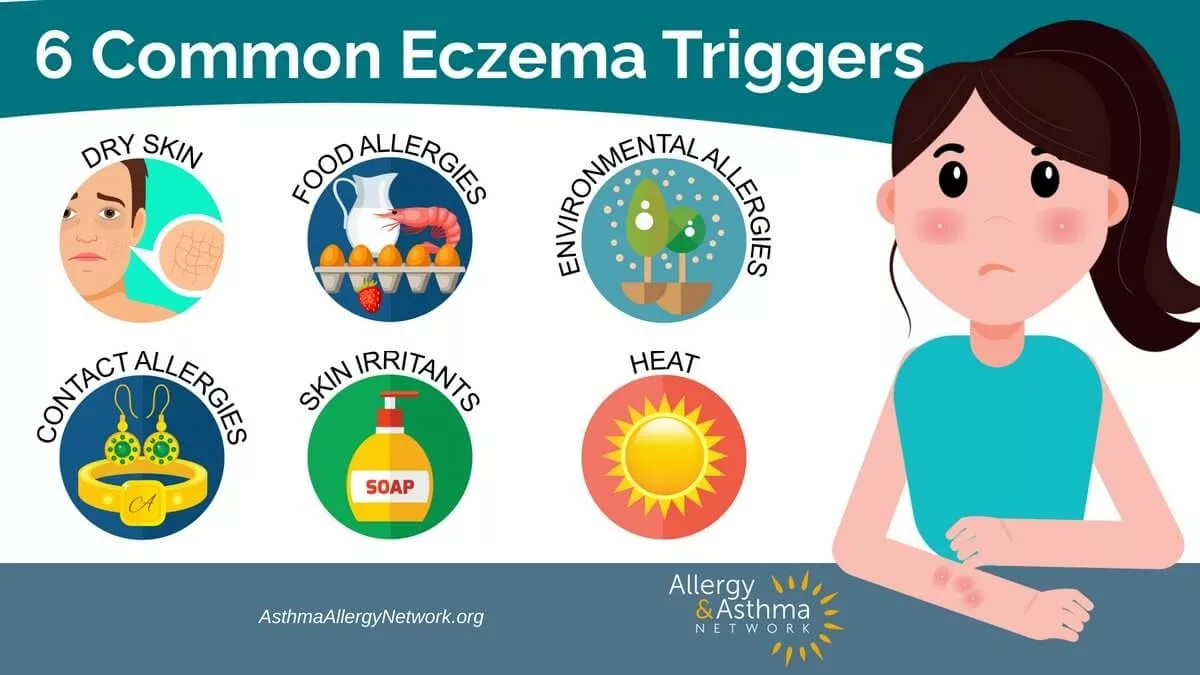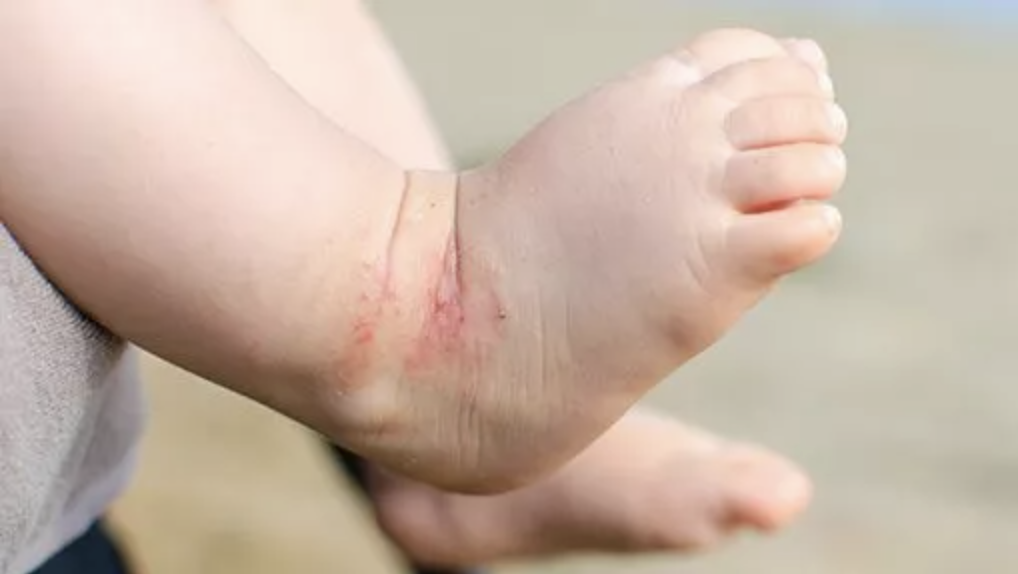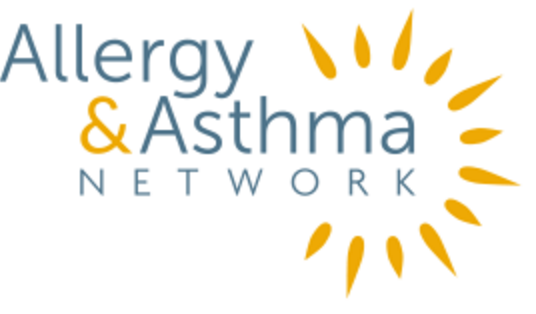An important part of an eczema treatment plan is preventing exposure to allergens and irritants that set off skin problems. First things first – you must identify what is triggering your eczema symptoms.

Triggers and symptoms for eczema are different for everyone.
What makes identifying them so challenging is sometimes a flare-up can occur hours after the initial exposure. Some people may experience symptoms in certain areas of the body or only at certain times of the year.
Trigger avoidance is essential in managing eczema, but it’s important to remember that, since eczema is a systemic condition, it is not a cure. Following are common eczema triggers.
Contact Allergies
Eczema is sometimes set off by something a person is in contact with on a regular basis. It could be a piece of jewelry that contains nickel, rubber or chemicals used in cosmetics, disinfectants and skin products.
An allergist can do a patch test to identify the specific allergens causing the problem.
Other potential skin allergens include:
- Antibacterial ointments such as neomycin and bacitracin
- Formaldehyde, which is found in some household cleaning products.
Dry Skin
When your skin is dry, it can lead to eczema symptoms. Some people have a genetic condition associated with a skin protein called filaggrin that causes their skin to lose moisture and allow allergens and bacteria to enter the skin more easily.
The best way to prevent an eczema flare is to keep your skin well moisturized. Recent research suggests that moisturizing a baby’s skin from birth may help prevent eczema from developing.
Dust Mites
These tiny insects live in mattresses, pillows, upholstered furniture – anywhere they can find moisture along with their favorite food, tiny bits of shed human skin.
Eczema patients may be allergic to dust mites. Allergens from their droppings and dead bodies collect in bedding, furnishings and house dust, then irritate skin, airways and eyes on contact.
When eczema is already flaring, dust mite allergens can worsen the problem. Encase your bed’s pillows and mattress with allergen-proof covers to put a barrier between you and the dust mites. Wash linens weekly and vacuum carpets, floors and furnishings with a HEPA vacuum.
Environmental Allergies
People with eczema may experience symptoms after exposure to certain grass, tree or ragweed pollen and/or indoor or outdoor mold.
It’s best to treat symptoms that arise from environmental allergens with aggressive moisturizing, along with antihistamines and topical corticosteroids if necessary.
Skin prick or blood testing for environmental allergies will help identify specific allergens to avoid.
Some patients may do well with allergen immunotherapy (allergy shots or tablets), in which a patient is given a gradually increasing amount of an allergen to build tolerance and reduce symptoms.
Food Allergies
Food allergens can play a role in the onset of eczema symptoms, particularly for infants and young children. Between 35 and 60 percent of young children with moderate to severe eczema also have food allergies.
It’s believed the breakdown of the skin barrier contributes to an allergic response when a food allergen is consumed.
Among children under the age of 2, eczema is most often related to milk or egg allergy, but it can occur with any food. Other common food allergens include peanut, tree nuts, fish, shellfish, soy and wheat.
Consult with a board-certified allergist for a diagnosis and then develop a plan to avoid the food allergen. Food-allergic patients are also at risk for anaphylaxis, a severe allergic reaction. Always carry two epinephrine auto-injectors, the treatment for anaphylaxis, if you have a severe food allergy.
Pet Allergies
Pet dander (dead skin cells), saliva or urine are normally harmless proteins, but for people with eczema they can trigger skin symptoms leading to respiratory problems. Early exposure to pet dander may contribute to the development of eczema in children who are prone to the condition.
Finding a new home for the furry pet is the most effective way to reduce levels of pet allergens in the home, but if that’s not a consideration, bathe your pet at least once a week and set up no-pet zones, including the bedroom.
Hormones
In women, hormone fluctuations may trigger or worsen eczema symptoms. Hormone changes occur just before and during menstruation, during pregnancy, after pregnancy, or when transitioning to menopause.
Outdoor Temperatures
Whether because it dries out skin or causes sweating, heat is a common eczema trigger. Sweat, in particular, can collect in your armpits or inner part of your elbow, leading to skin irritation.
Meanwhile, in winter months, humidity that provides moisture in the air decreases, resulting in dry skin.
In addition, a sudden rise or drop in temperature can trigger an eczema flare.
Strategies to keep comfortable in hot and cold weather include:
Hot Weather
Wear appropriate clothing: light, breathable clothes in the summer. Avoid going outside during peak heat times during the day, usually between 10 a.m. and 3 p.m. If you do go outside, keep a small towel with you to wipe away excess sweat.
Stay hydrated to moisturize from the inside out.
Cold Weather
Wear gloves in the winter (since hands are particularly sensitive and often exposed to cold). Consider a humidifier to moisturize the indoor air.
Skin Irritants
While they are not true allergens, some soaps, shampoos, detergents, fragrances and wool or synthetic clothing can significantly irritate sensitive skin.
Heavy or tight clothing that rubs against the skin can also cause symptoms. Use gentle, nonirritating products and stick with them.
Natural fiber clothing such as cotton or silk is usually most comfortable. Once an area gets irritated, it can take a long time for it to calm down.
Stress
An increase in stress may either cause an eczema flare or worsen an existing one. Some patients may scratch more often when they’re feeling pressure. Managing stress effectively can reduce flares.
Coping strategies such as meditation or yoga, regular exercise, getting enough sleep, and connecting with family and friends are great ways to take your mind off your worries.
Tobacco Smoke
Cigarette smoke, including secondhand smoke, can irritate skin in addition to the lungs and eyes. Set a no-smoking policy both inside and outside your home; smoking is a major health issue for everyone.
et_pb_module et_pb_text et_pb_text_16 et_pb_text_align_left">Viral and Bacterial Infections
The common cold can cause an eczema flare. In addition, the herpes virus, which can cause cold sores in and around the mouth, can lead to flares – including a potentially serious infection that can spread cold sores to other areas of the body.
Exposure to bacteria can cause harmful toxins to secrete into the skin, prompting an immune reaction and causing skin inflammation. One of the more common bacteria is Staphylococcus aureus, which can not only worsen eczema but also slow skin healing.
© 2021 Allergy and Asthma Network

Last updated : 2/6/2023